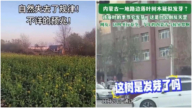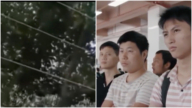【新唐人2014年07月29日讯】中国由于中共实施“一胎化”的所谓“计划生育政策”,从1999年开始,中国社会快速进入了老龄化。2004年底,中国65岁以上的人口占总人口的 7.6%。2011年底,中国60岁老龄人口已达到1亿8500万,预计到2030年,全中国60岁以上的人口大约有3亿5000万。如何看待和解决中国的养老问题,一起去听听民众和学者的想法。
在1949年之前,中国人几千年来都是采用家庭养老的模式。从1980年代开始,中共实行“一胎化”所谓的“计划生育政策”,导致21世纪后,成年的独生子女必须一人扛起父母两人的养老问题。
原云南企业家朱承志:“困难应该是相当的大,农村的或者是城市里边没有养老收入的,没有退休金。再一个,人老了难免体弱多病,在目前医院已经不是救死扶伤的地方,医院就是抢钱的地方。你说:夫妻2个要来承担上有老、下有小,再碰上抢钱的医院,那他们怎么能够承担?”
与传统模式相对应的是社保基金模式。上周,大陆官方的审计署发表了2013年年度报告,曝光了“社保基金”理事会管理的自营指数化投资组合,在过去几年中亏损70亿人民币。
目前中国大陆中共官员和公务员的退休金和医疗保险等由政府负担,其他公民则需要每个月按工资收入的比例,缴纳“社保金”,也就是老百姓所说的“五险一金”。这些钱一般由地方政府管理。很多民众对中共的“社保基金”的黑箱管理非常不满,从往年的经验看,一旦发生亏空,老百姓必须自己承担,抗议、申诉都无法解决。
北京师范大学MBA导师段绍译:“这个是没法讨的。一方面这个养老金是被政府官员、有权力的人挪用到另外的地方去了,第二个方面就是它没有专门的投资机构,没有让这些养老金能够升值。管理得好的话,它这个基金是可以生钱的。它不但没有升值而且缩水。”
除了“社保基金”大陆当局近年来推出多个养老模式,大多引起民间反弹。如“以房养老”,就是拥有住房完整产权的老人,可将房屋抵押给保险公司,并按照约定条件定期领取养老金直到去世。但去世后房产的处置权归保险公司,而不是老人的子女。民间普遍的反应是:工作了一辈子,没人管养老,就够不讲理的了,还要把一生节衣缩食赚钱买的房子抢走,政府真是“吃人不吐骨头”!
大陆各城镇近年来还兴建了一些养老院。但高昂的价格,一般民众无法承受。
朱承志:“养老院普遍来说,收费都比较偏高,承担不了。比如我家老太太(母亲)都快100岁了,我3月份去成都,接谭作人,我不得以把老太太送到了养老院。虽说只是10来天,但对这个事情感触比较深。”
中共在1949年建政前,曾大力宣传所谓“共产主义”的“人间天堂”理论,其中包括“物质极大丰富”、“老有所养”等。事实上,大陆各历史阶段的老人们所经历的与共产理论完全相反。上世纪60年代“大饥荒”中,首当其冲被饿死的就是老人、小孩。现在所谓改革开放30年后,“老失所养”成为民间社会最大的忧虑之一。
段绍译:“政府承担,首先它要有这方面的财力,另外他们有这个动机。目前来讲这两样东西他们是不足的。说完全没这个财力,也不能这么说。这个国家反正是有钱,但是它把钱用到哪里?第二点,中国不是民选的政府,它给大家管好这个事,官员没有什么好处,所以他没有做好这个事的动力。”
据预测,到2030年全中国人口总数将达到大约15亿,60岁以上人口大约有3亿5000万,占总人口的1/4。如何解决中国的养老问题﹖《新唐人》评论员赵培表示,反腐、改革这些好听的名词不能养老,不能带来公平,只是中共党内利益分配的调正而已。想要公平待遇必须中共下台。
采访编辑/唐音 后制/钟元
Major Issues With Chinese Pension System Exposed: Retirement System Failure
Since the so-called Family Planning Policy, which allows only
one-child, has been carried out, Chinese society quickly aged.
By the end of 2004, 7.6 percent of China’s total population
is age 65 and over.
By the end of 2011 China had 185 million people
age 60 and over.
It is forecast that in 2030, China will have 350 million
elderly people age 60 and over.
So how should China’s pension problem be solved?
Let’s see what the experts and the people are saying.
For thousands of years before 1949, family support
of elderly people in China existed.
Beginning in the 1980s, the Chinese Communist Party (CCP)
implemented the so-called family planning policy
which only permitted one child per family, resulting
in elderly-care issues.
In the 21st century the sole child has to take on
the responsibility of supporting both parents.
Former Yunnan entrepreneur Zhu Chengzhi:
“The difficulty should be quite serious.
In rural or urban areas, elderly people are without
retirement income or a pension.
In addition, elderly people are inevitably frail and weak
with a lot of illness, but currently hospitals are places
for robbing money rather than healing the wounded
and rescuing the dying.
So can you imagine, the young couple has to bear
the burden of supporting both their parents and child,
incorporating hospital expenses for their elderly parents.
How can they bear it?"
The alternative method for the traditional family-support
of elderly is the social security fund support model.
Last week, the CCP Audit Bureau published the 2013
annual report exposing the loss of seven billion RMB
over the past few years of the self-indexation portfolio
managed by the National Social Security Fund (NSSF).
Currently in China, the pension and health insurance
of officials and civil servants are paid by the governments.
But other citizens have to pay monthly social security funds
by a certain proportion of wage income, the so-called
six social security payments (funds).
All these funds are generally managed
by the local governments.
Many people are very unhappy with the CCP’s
black-box management by the NSSF.
From previous years experience, once the deficit occurs,
the fund-payers must assume the loss by themselves.
Protests and complaints have all gone in vain.
Beijing Normal University MBA tutor Mr Duan Shaoyi:
“There is no way to recover the loss.
On the one hand, the pension funds have been diverted
to other fields by powerful government officials.
On another hand, there is no dedicated investment agency
to appreciate these pensions.
If they are well managed, then these funds are able
to generate more money.
However, these funds currently failed
to appreciate and even depreciated."
In addition to the NSSF, Mainland Authorities have launched
a number of pension models in recent years.
Most of them have been opposed by the people.
Supporting the elderly via their own house means the elderly
have full property rights for mortgaged through insurance
company, and in accordance with the agreed conditions
pensioners regularly receive pension until death.
But after their death, insurance companies will control
the right to dispose of property rather than the next of kin.
Thus, the common response from the people includes
working through lifetime and nobody responsible
for the pensions are considerably unreasonable;
Furthermore the owned houses which were bought
by lifetime saving will be also finally taken away,
and hence the government is really
“eating people without spitting out the bones!"
Retirement centers have been built in many cities
and towns in China in recent years.
But the general public cannot afford the large expense.
Zhu Chengzhi: “In general, the charges in retirement centers
are relatively high and unaffordable.
For example, my mother is almost 100 years old.
In March of this year, when I went to Chengdu to pick up
Tan Zuoren, I had to send my mother to a nursing home.
Despite it having been only 10 days, I still have
relatively deep feelings on this matter."
Before 1949, the CCP government vigorously promoted
the “paradise on earth" theory with so-called communism,
including the sayings “great wealth of products,"
“pension security for the elders" and others.
In fact, the existing historical stages which old people have
experienced are completely opposite to communist theory.
During the Great Famine of the 1960s, the first groups
of people who starved to death were the elderly and children.
Now after 30 years of implementing reform and opening up,
the so-called “pension security for elders"
has become one of the biggest concerns of the society.
Duan Shaoyi: “If governments are responsible for pensions,
there first needs to be enough financial ability,
plus they have to have the motivation.
But currently, two such aspects are both inadequate.
We cannot completely say they have no financial ability.
This country has money, but where did the money go?
Secondly, China is not a democratically elected government.
There are no benefits to the officials in managing well
and solving this matter so they have no motivation
to deliver well on the task."
It is predicted that by 2030, the entire Chinese population
will reach about 1.5 billion with 350 million age 60 and over,
which accounts for one fourth of the total population.
How should China’s pension problem be solved?
NTD commentator Zhao Pei said such good anti-corruption
and reform terms cannot offer pensions for the elderly.
Neither is it fair.
They actually just re-distribute the interests
among the different components of the CCP.
If fair treatment is desired, the CCP must step down.
Interview & Edit/Tangyin Post-Production/ZongYuan




























